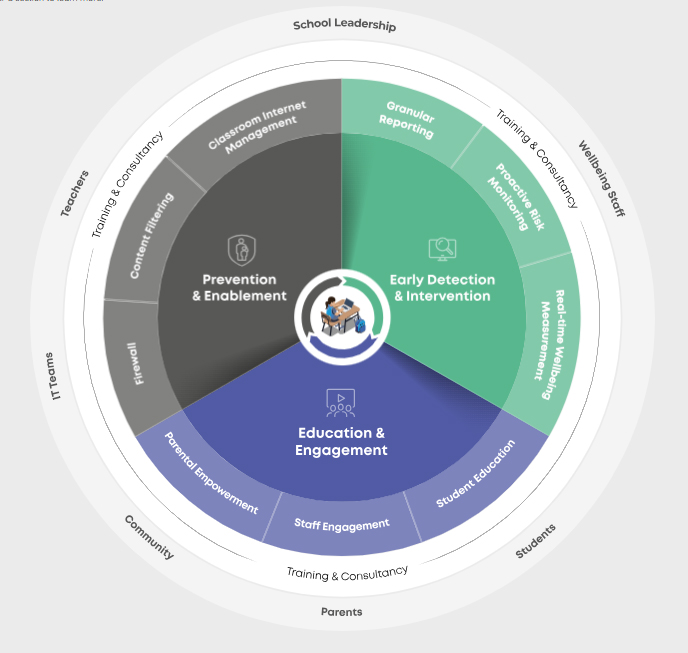
Earlier this year we learned that one in eight children have experienced online child abuse or exploitation in the last 12 months. In response to this alarming trend, Ofcom recently announced they will punish social media companies that fail to keep children safe online. This is a more deliberate and focused approach to the Big Tech giants that have so far avoided accountability for the harms caused through their platforms.
The mobile phone problem
Our recent research has found that traditional comms messaging such as texting remains a key method for teens and children in sharing explicit content. In response to concerns over mobile phone use by young people, the government has been ramping up its response, with some MPs calling for a mobile phone ban in schools to be made law. However, it is not clear how effective the implementation of this law will be and whether other measures can be put in place to protect children from online harm.
As of 2024, 98% of children aged 16-17 own a smartphone, nearly a quarter of children aged 5-7 have a smartphone and only 3% of British 12-year-olds do not own a smartphone. For many parents, mobile phones are considered an important tool to ensure their children are contactable and to keep them safe. However, the exposure to risks and the influx of young children becoming reliant on a smartphone is a widespread problem.
Could a mobile phone ban be the solution?
The deaths of Molly Russell and Brianna Ghey, allegedly caused by exposure to online dangers, received an enormous level of publicity.
Brianna’s killers, Scarlett Jenkinson and Eddie Ratcliffe, were aged just 15 when they plotted to kill her. They shared hundreds of WhatsApp messages in the run-up to the killing, sharing fantasies about murder and torture.
It led to calls for government and regulators to keep children safe online. The introduction of the Online Safety Bill last year was a pivotal moment in protecting children online. However, it also fuelled the debate around freedom of speech and privacy entitlements.

John MacAlister, Labour Member of Parliament for Whitehaven and Workington, wants to raise the age of internet adulthood from 13 to 16 and ban mobile phones in schools.
Most schools have already either banned or limited the use of mobile phones. Many believe that bans backed by legislation will give headteachers the enhanced support they need to make schools a completely mobile-free zone.
Bans may initially bring benefits to the classroom by limiting distractions. However, some predict that once the novelty wears off, children will sneak their mobile phones into school. The result could be an increase in behavioural management issues for staff who may already struggle to deal with rule breakers.
A blanket ban on mobile phones in schools will not keep children safe online; it will drive them underground. It will not teach children digital literacy skills and how to engage in healthy technology use. Instead, this could exacerbate harm by failing to equip children with the skills required for an increasingly connected digital future.
What are young people looking at?
What children can access on mobile devices goes well beyond the realms of what most parents or schools would consider possible.
An example of this is seen with children using advanced technologies like AI or deepfakes for explicit content creation. Recent research from Qoria found that in the UK:
- 28% of school communities surveyed experience monthly incidents of students possessing, sharing, or requesting nude content;
- 11% report it weekly;
- Snapchat was revealed to be the most common platform where children are asking for or sharing nude imagery;
- 16% of explicit content is shared through texting on mobile phones.
Age verification – a tempting yet challenging solution
For many, age verification is seen as the silver bullet that will keep children safe online. They hope it will reduce online risks such as child sexual abuse material (CSAM) and enable companies to raise the age of social media access.
However, like many quick-fix strategies, age verification is not quite the simple solution it seems. Policing the online world is not the same as policing the physical world. There are infinite ways children can access various platforms and jump through loopholes.
VPNs and biometric hacks are just two examples of methods already being used to circumvent these measures. The current age verification proposal will continue the existing whack-a-mole approach to content regulation and steer children to more toxic or unregulated parts of the internet, such as the dark web.
Bans in principle, like those for mobile phones in schools, trigger a ‘forbidden fruit’ mentality where children will continue to seek out ways around them or find alternative and far more dangerous ways of getting access to online content instead.
Better solutions are available
While nothing is perfect, far more robust solutions currently exist to safeguard children and, when leveraged for good, technology can play a pivotal and impactful role.
Solutions such as enterprise on-device safety technology are a far more effective means of protecting children in online spaces because they control access from the device the child is using.
This technology can secure devices, create tailored and age-appropriate online experiences (including access to social media), block pornography effectively and be a simple solution for parents who are currently required to update and manage safety settings on hundreds of apps their child is likely to use.
However, the catch is that this technology is not currently made available to parents, only big businesses with commercial influence. Should this technology become accessible to parents, it would be a global game-changer for children’s online safety.

Parents and the school community must work together
We need better tools and training to help educators and parents identify and address these issues. Our research found that 78% of UK schools believe parents’ lack of awareness of child sexual abuse material and explicit content is a significant barrier to this.
One UK primary school staff member noted: ‘Whilst parents are monitoring the amount of time their children spend online, they don’t seem to be monitoring what they are viewing or accessing. The confidence schools have in monitoring children closely is something that needs to be educated and passed onto parents.’
Schools have reported seeing children as young as eight sharing or requesting nudes, evidencing the critical need for this education to be delivered far sooner than many people expect. We need more emphasis on student education, particularly by introducing sex and relationships education at an earlier stage and incorporating information and resources that address digital environments.
School projects
Qoria has been working with schools to show how taking a bottom-up approach to educating staff and students together can be effective when teaching digital safety.
Students have shared their biggest concerns around digital environments and have worked collaboratively with educators to develop solutions. These young digital ambassadors present the collective ideas to their peers, ensuring each layer of the school ecosystem buys into effective safeguarding practices.
It is encouraging to see that as online risks and smartphone technologies evolve, so too do the innovative solutions developed to support schools and parents. These solutions can also guide schools to refocus on ‘technology for good’.
These approaches highlight the positive impact of student voice and leverages their ideas and creativity to develop innovative solutions. They show how young people can contribute to safety in the online world and offer strategies schools can use to ensure the whole community is involved.
By encouraging collaboration and innovative thinking and prioritising targeted digital safety education, schools can address online challenges without resorting to blanket bans on technology and can avoid unintended consequences.
Yasmin London is Global Online Safety Expert & Brand Director at Qoria.
Register for free
No Credit Card required
- Register for free
- Free TeachingTimes Report every month